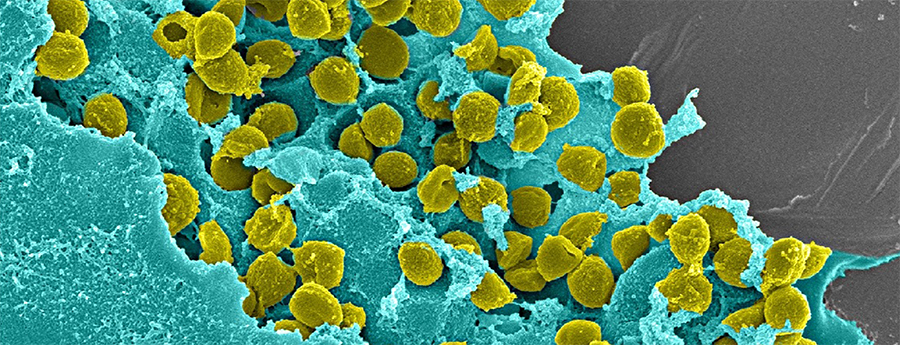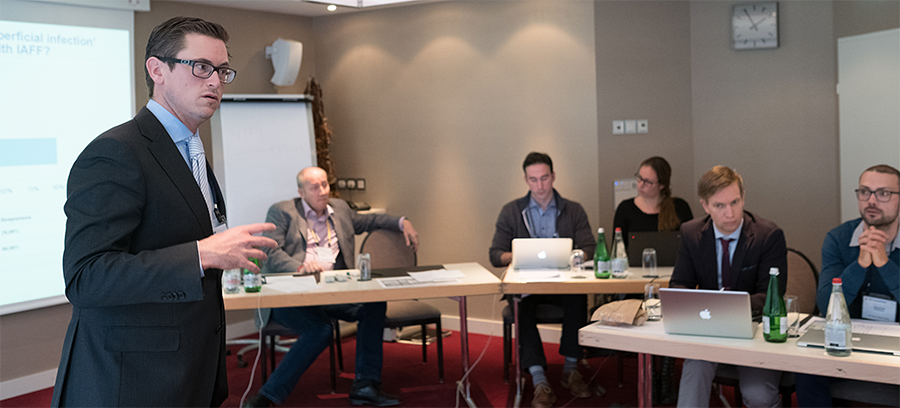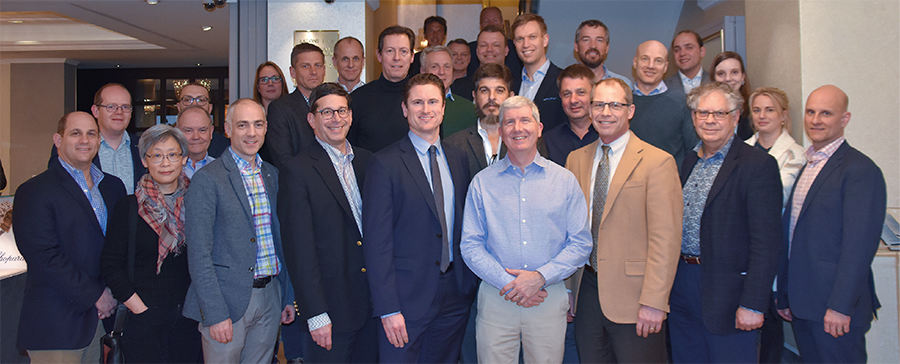Fracture-related infection: new consensus on diagnosis and treatment
Fracture-related infection (FRI) is one of the most complex problems in modern orthopedic trauma surgery. Even after exemplary surgical care, patients can still suffer from infection at the site of the operation, and this has significant impact on their recovery. To address this issue, the Technical Commission's Anti-Infection Global Expert Committee (AIGEC) has focused its efforts on pioneering work to improve the prevention, diagnosis, and treatment of infection. It has developed consensus guidelines for the diagnosis and treatment of FRI, which should enable improvements in clinical studies on infection incidence, reduce the cost of treatment, lead to more effective treatment strategies, and promote better patient outcome.
Fig 1 A Staphylococcus aureus biofilm; commonly present in fracture-related infection.
Chaired by Prof Michiel Verhofstad (Rotterdam, NL), the AIGEC is composed of global key opinion leaders in the field of infection, including orthopedic and trauma surgeons, microbiologists, infectious disease specialists, and basic scientists. AIGEC members saw a clear opportunity to address FRI by leveraging the reputation and global reach of the AO Foundation to bring together key opinion leaders to reach a consensus on current clinical issues. Together with the AO Research Institute and the AO Trauma Clinical Priority Program on bone infection, two international consensus meetings were convened.
At a first consensus meeting in December 2016 (Fig 2), a group of experts, including representatives from the European Bone and Joint Infection Society (EBJIS) and prominent orthopedic trauma centers with a major interest in FRI agreed on the fundamental features of FRI, and established a definition for FRI that was published in 2017. This international consensus definition offers the opportunity to standardize clinical reports in daily practice and improve the reporting of clinical studies in FRI.
Fig 2 Willem-Jan Metsemakers (University Hospitals Leuven, Belgium) addresses the members of the international expert group discussing the development of a definition of FRI.
A broad consensus on diagnosis and treatment principles for FRI was achieved at a second meeting held in Zurich, Switzerland, in February 2018 (Fig 3). Supporting the meeting were 35 experts and key opinion leaders in the field of FRI including surgeons, infectious disease specialists, clinical researchers, and research scientists. Representative organizations included the EBJIS, the Orthopedic Trauma Association (OTA), and the PRO-IMPLANT Foundation. Importantly, the new definition of FRI was updated here and endorsed by the different organizations (AO, OTA, EBJIS, and the PRO IMPLANT Foundation). In 2018 this consensus definition was also endorsed by the delegates of the International Consensus meeting held in Philadelphia, US.
Fig 3 Members of the international consensus group from Argentina, Belgium, France, Germany, The Netherlands, South Africa, Switzerland, the UK, and the US met in Zurich to discuss the diagnosis and treatment of FRI.
Four papers containing recommendations for the diagnosis and treatment of FRI were published in early 2020. Trauma surgeons worldwide need access to a single, reputable site to access these FRI recommendations, and work is underway within the AO Foundation to build an online platform to achieve this aim. At the same time, dissemination of the FRI recommendations is also proceeding via several other channels:
-
Symposium session at major orthotrauma congress (ie, opening symposium at the annual OTA meeting, Denver, US, 2019)
-
Meet the Experts session in Davos, December 2019
-
Inclusion of the new guidelines in future AO Basic and Advanced Principles Courses
Video AIGEC members, Willem-Jan Metsemakers (University Hospitals Leuven, Belgium) and Bill Obremskey (Vanderbilt University Medical Center, Nashville, Tenn, US) present the recently published FRI consensus recommendations in a Meet the Expert session to a live audience in Davos and an online audience of more than 500 trauma surgeons.
The global availability and adoption of the new guiding principles for FRI should enable improvements in clinical studies on infection incidence, reduce the cost of treatment, lead to more effective treatment strategies, and promote better patient outcome.
The consensus work of the AIGEC is firmly based on both interdisciplinary and cross-organizational collaboration. Bringing different specialists from diverse fields together creates powerful synergies and new opportunities to solve the longstanding problem of FRI. "Within this consensus group we are one team leading together, those more experienced were always supportive, and that's what makes this project so great—support from the AO and the entire scientific community," says Michiel Verhofstad, AIGEC Chair.
Building on the achievements of the last 4 years, the AIGEC is now focusing on new international initiatives in collaboration with other organizations, including further consensus work on the prevention of FRI, and the validation of the diagnostic criteria for FRI. The AO is honored to play a leading role in international efforts to prevent FRI and to support the AIGEC in driving forward this vital work and improving patient care.
You might also be interested in
Fourth FRI consensus meeting
Aiming to develop consensus-based guidelines in the field of FRI and nonunion, paving the road for the future.
Update from the OSSTF
Explore the brand-new White Papers on Techniques and Considerations for Surgery of the Osteoporotic Spine.
2022 Update from the SDSTF
Survey results on wearable technology in the orthopedic trauma community are available open access.







